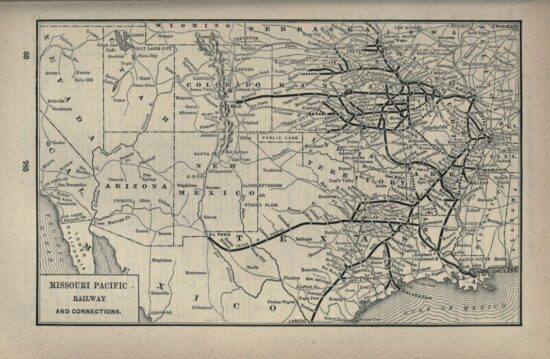William P. Ellison’s story taken from the St. Louis Republic will be read with interest, particularly by many of our older citizens who remember him. The Ellisons were an old and influential family in this section and flourished in Scioto, Adams, and Lawrence Counties [Ohio]. We are told that many years ago, the tomb of Archibald Ellison at Hanging Rock was a familiar object to rivermen and was pointed out to travelers. Still, the encroaching river eventually necessitated its removal.
Strangely, a man like William P. Ellison should have lived till this day without having ridden in a railway train, through living almost within [the] sound of their whistles and being himself the prime mover in great railway enterprises. The Republic says:

Last evening William P. Ellison passed through the city. He is one of the oldest citizens in the state and was associated with Thomas Allen and other great men of that day in the promotion of the Missouri Pacific Railroad. The first railroad was built west of the Mississippi River. Strange to say, while he was thus present at the very inception of the railroad industry in the West and was an energetic advocate of their usefulness, he had- never until yesterday rode on a railroad train in his life.
While waiting for a train last evening at the Union depot, he attracted the attention of a Republic reporter with his odd dress and manners. As he walked about the waiting room with his hands in his pants pockets, rattling silver or gold coins and sharply watching the maneuvers of one or more “confidence men” who had attempted to convince him that they were his old friends, he was a true type of a Southwestern coon hunter or trapper.
“My name is William P. Ellison,” said he to a Republic reporter, “and I live on my farm, two miles from Robertson, Franklin county, forty-one miles west of St. Louis. I was born in Burlington, Lawrence County, Ohio, in 1817 and was educated in Athens. I came to Missouri in 1871 [, and] moved to Franklin county. Where I raised my family. I have been a farmer, Methodist preacher, politician, and journalist. I edited the Burlington Express in Burlington, Ohio.
“Before the war, I took an active part in helping to develop our great state, and this evening I have been thinking of Thomas Allen and other noblemen with whom I worked. I was with him in 1850 at one of the first meetings ever held west of the Mississippi River to take steps toward building a railway, ultimately reaching the Pacific Ocean.
This meeting was held in North’s store, now Gray’s Summit, in Franklin county. Mr. Allen was there to explain to the people what was meant by his act of the legislature incorporating the Missouri Pacific Company, passed in March 1849, and to convince them that railroads were practical and would benefit them.
“I saw the first ground broken for the Missouri Pacific on July 4, 1851. It was a lively day in St. Louis. All the societies turned out, and the assemblage was great in the governor’s absence. Thomas Allen delivered the opening speech and presented the spade to Luther M. Kennett. Mayor of the city, who broke the first earth ever broken for a railroad west of the Mississippi River, and the Pacific Ocean was inaugurated.
“In company with Governor Bob Stewart, I stumped North Missouri when it was necessary to convince the people that the Hannibal and St. Joseph Railroad would benefit them, and I had the pleasure of seeing the ground broken for the road at Hannibal in 1852. I was also at the nullification at St. Charles when the old North Missouri railroad was completed to that place in 1854 and at Macon City when Mrs. Isaac Sturgeon of St. Louis spaded the first ground for the extension of North Missouri to Iowa.
“Now, you will be surprised when I say that I never rode on a railroad train until this morning, when I left Robertsville to see my daughter, Mrs. Jean Ellsworth, who lives at Mulberry Grove, Ill. I have traveled over the state but always had to go on horseback or by other conveyances. When I return home, I will tour the country by railroad and try and get an idea of the grand progress made during the past half-century.”
Mr. William P. Ellison told the Republic reporter that during the war, he was a “Union soldier, a Methodist preacher, and a Democrat,” leaving the reporter under the impression that that was a rather queer combination. He is still a Democrat, but whether he is a Methodist preacher or not, we don’t know. He cast his first vote for Martin Van Buren in 1840.
If he should come back to his old home would find that Burlington, Ohio, is not quite so large as when he cast his first vote there and not near of so much importance, for it was then the county seat, which honor has long since gone to Ironton, Ohio. He would find Burlington a picturesque relic of the past. Still, he would also find flourishing cities and towns all around it, on both sides of the river, a great railroad bridge spanning the river in sight of it, and evidence of progress all around.

0 Comments